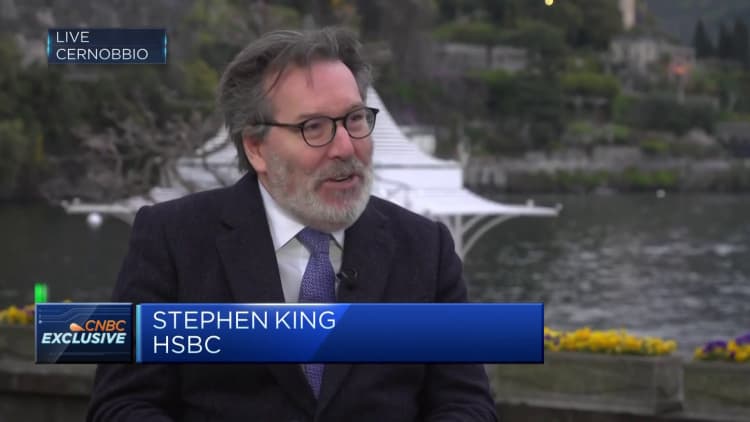
[ad_1]
One Canada Sq., on the coronary heart of Canary Wharf monetary district seen standing between the Citibank constructing and HSBC constructing on 14th October 2022 in London, United Kingdom.
Mike Kemp | In Photos | Getty Photographs
The extended interval of free financial coverage after the worldwide monetary disaster equated to central banks “nationalizing bond markets,” and meant policymakers had been sluggish off the mark in containing inflation over the previous two years, in line with HSBC Senior Financial Adviser Stephen King.
Central banks around the globe have hiked rates of interest aggressively over the previous 12 months in a bid to rein in hovering inflation, after a decade of free monetary situations. The swift rise in rates of interest has intensified considerations a few potential recession and uncovered flaws within the banking system which have led to the collapse of several regional U.S. banks.
Chatting with CNBC on the Ambrosetti Discussion board in Italy on Friday, King mentioned that whereas quantitative easing had benefited economies making an attempt to get well from the 2008 monetary disaster, its period meant that governments had been “most likely far too relaxed about including to authorities debt.”
“A part of the issue with QE was the truth that you are mainly nationalizing bond markets. Bond markets have a really very helpful position to play once you’ve received inflation, which is that they’re an early warning indicator,” King informed CNBC’s Steve Sedgwick.

“It is a bit like having an enemy bombing raid and also you flip off your radar methods — you’ll be able to’t see the bombers coming alongside, so successfully it is the identical factor, you nationalize the bond markets, bond markets cannot reply to preliminary will increase in inflation, and by the point central banks spot it, it is too late, which is strictly what I feel has occurred during the last two or three years.”
The U.S. Federal Reserve was sluggish off the mark in mountain climbing rates of interest, initially contending that spiking inflation was “transitory” and the results of a post-pandemic surge in demand and lingering provide chain bottlenecks.
“So successfully you have received a scenario whereby they need to have been elevating rates of interest a lot a lot earlier than they did, and after they lastly received spherical to elevating rates of interest they did not actually need to admit that they themselves had made an error,” King mentioned.
He advised that the “wobbles” within the monetary system over the previous month, which additionally included the emergency rescue of Credit Suisse by Swiss rival UBS, had been arguably the consequence of a chronic interval of low charges and quantitative easing.
“What it encourages you to do is successfully increase funds very cheaply and put money into every kind of belongings that is likely to be doing very nicely for a brief time period,” King mentioned.
“However once you start to acknowledge that you have an inflation drawback and begin to increase charges very very quickly as we have seen over the course of the final couple of years, then numerous these monetary bets start to go somewhat badly mistaken.”
[ad_2]